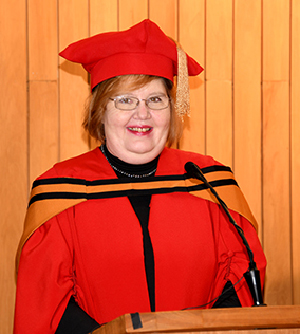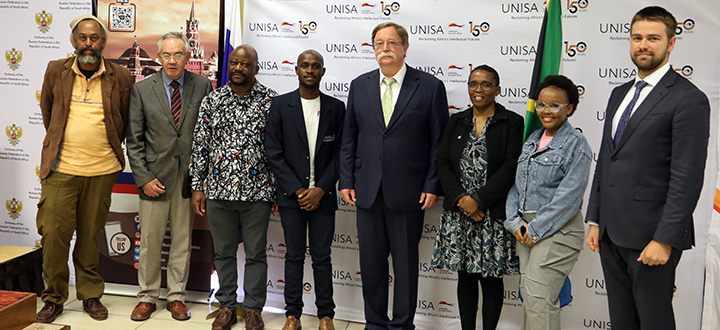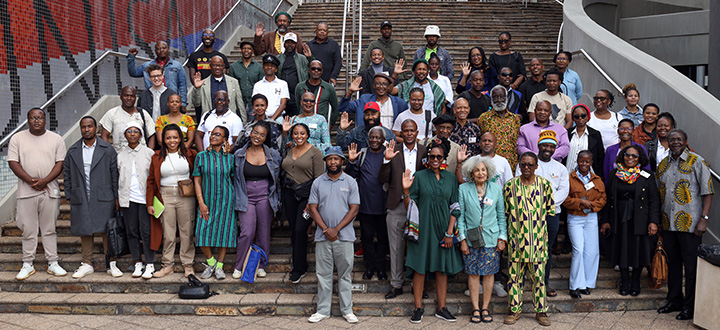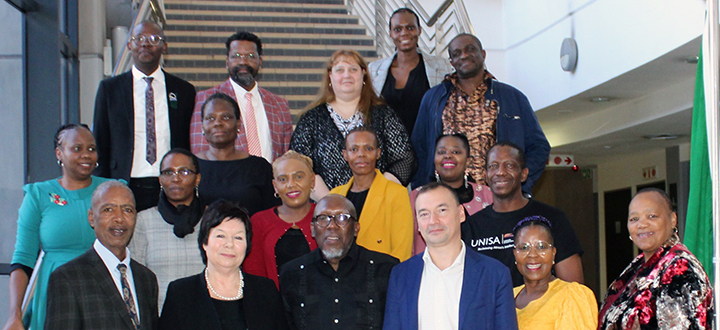College of Human Sciences
Unfinished business: Exploring the dark history of the church

Prof Erna Oliver
On 30 June 2021, Prof Erna Oliver gave her inaugural lecture entitled "The unfinished business of church history". She is attached to the Department of Christian Spirituality, Church History and Missiology in the College of Human Sciences.
A regrettable past
Oliver’s lecture took the audience on a journey through the history of South Africa’s churches, especially Afrikaans churches. She engaged with the audience on historical guilt and responsibility. Oliver said that many churches were accomplices in past atrocities and supported the evils of apartheid. The important question, she said, is where the church finds itself now and how it can renew its focus on the ongoing need for constant reformation.
Oliver’s lecture covered the evolution of the church and juxtaposed it with our modern and current lives. She pondered where we find ourselves and how the church can help our current situation.
Oliver stated that 80% of South Africans are Christians, meaning that they subscribe to Christian beliefs and morals. "Why then," she asked, "do we have such a high rate of murder, rape and abuse, and a general decay of morality?"
Change failure
Oliver’s lecture touched on the sensitive and controversial subject of missiology. Oliver stated: "The reformation failed to produce a radical change in the behaviour of believers at grassroots level because doctrine is still triumphing over the correct way of living. Christians still do not understand the importance of being missionaries in everyday life. Furthermore, western missiologists thought that the westernised forms and norms of Christianity were the only correct interpretation of the religion and that it had to be applied to all people and all Churches."
Oliver said that in the present South African environment, the messy missiological history and the current lack of actions by the traditional Afrikaans-speaking Churches are perhaps the biggest mountain of unfinished business waiting to be addressed and sorted out before signs of new life can be sought.
Oliver also sent out a strong warning to the churches: "When it comes to Christian faith and the church as institution in South Africa, it is no longer possible to hide from the mountain of issues that is currently avalanching."
Did the lecture offer solutions? No. It did exactly what a lecture should do: Awaken the mind, awaken society to the facts and influence it to seek the answers.
Prof Oliver in her own words
"I am a church historian," says Oliver, "because history is the mother discipline of all theology disciplines. Ever since my initial graduation, my dream has been to supervise students. I had to put this dream on hold to raise my children and focus on family; it is a decision I do not regret." She eventually reached her dreams and is now a supervisor of postgraduate students.
Oliver also takes community engagement seriously, being part of her department’s flagship community project, the "Meal of peace". "This project deals with the problems of homeless people in Pretoria," she says.
Ongoing failures
On the topic of her lecture, Oliver says that the church will presumably have unfinished business until the day when Christ returns. "Church history will, in gruesome detail, bear witness to the missed opportunities, the failures and wrongdoings, and all the mistakes made," she says. "This is especially true in South Africa where racial tensions, violence, crimes and numerous other evils prevail, while the bride of Christ, in hiding from the realities of life, is seemingly awaiting death."
In conclusion, she says that a comprehensive, amended rewriting of church history that includes all sources that fed Christianity in South Africa during the past nearly 370 years must reconceptualise our religious past towards a healing future. "This can promote unity and bring closure to at least some historical and theological issues while providing a renewed focus on the ongoing need for constant reformation, a renewed comprehension of spirituality, and inspire missiology towards a new, serving Christianity in a broken and bleeding society."
* By Veli Mabona, Marketing Assistant, College of Human Sciences
Publish date: 2021-07-05 00:00:00.0

 Unisa's student leadership engage with Russian ambassador
Unisa's student leadership engage with Russian ambassador
 Re-igniting and re-imagining Pan Africanism, Afrocentricity and Afrofuturism in the 21st century
Re-igniting and re-imagining Pan Africanism, Afrocentricity and Afrofuturism in the 21st century
 Unisa and Russian State University for the Humanities explore collaborative opportunities
Unisa and Russian State University for the Humanities explore collaborative opportunities
 Young Unisa science stars join elite Lindau Nobel Laureate group
Young Unisa science stars join elite Lindau Nobel Laureate group
 Education MEC addresses Unisa autism seminar
Education MEC addresses Unisa autism seminar